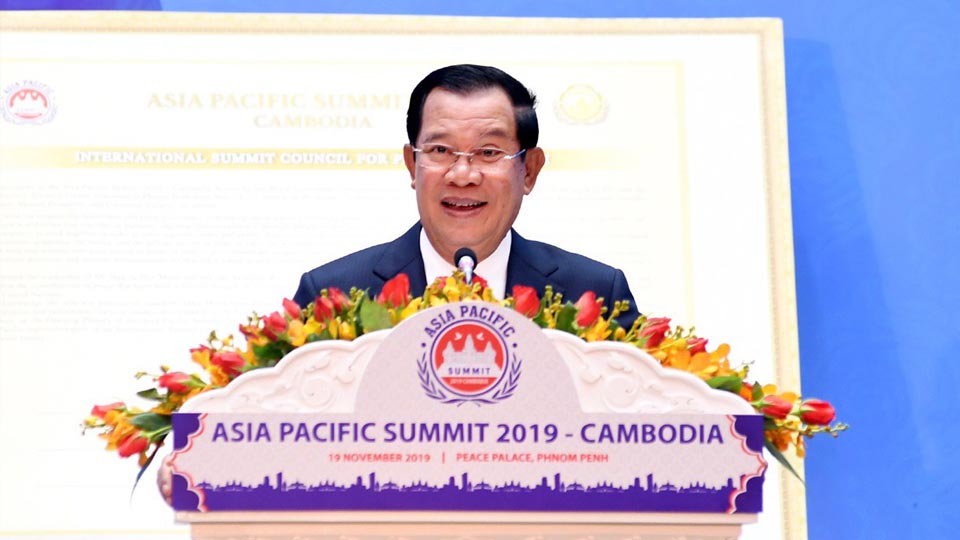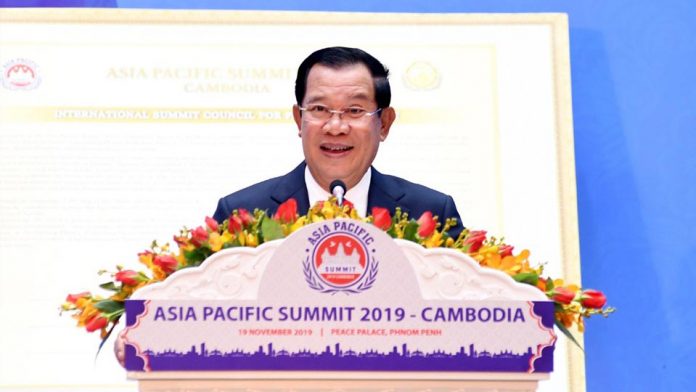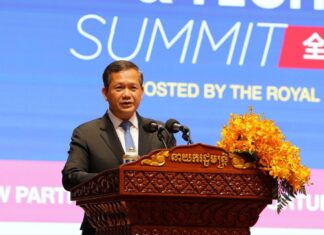- Lok Chumteav Hak Ja Han Moon, Co-Founder of the Global Peace Federation;
- E. Jose De Cenecia, Founding President of ICAPP;
- Excellencies Heads of States/Governments, Ex Heads of States/ Governments, President of Parliament;
- Samdech, Excellencies, Ladies and Gentlemen, Distinguished National and International Guests!
 Today, I am very proud and delighted to participate in the Opening Ceremony of the Asia-Pacific Summit 2019 – Cambodia under the theme of “Responses to the current Key Challenges: Peace, National Unification, Mutual Dependence and Prosperity, Global Values”, that is solemnly celebrated now.
Today, I am very proud and delighted to participate in the Opening Ceremony of the Asia-Pacific Summit 2019 – Cambodia under the theme of “Responses to the current Key Challenges: Peace, National Unification, Mutual Dependence and Prosperity, Global Values”, that is solemnly celebrated now.
I would like to welcome and thank Excellencies, Heads of States/Governments, President of the Parliament, Samdech, Excellencies, National and International Guests, who are currently present in this important summit.
On behalf of the Royal Government of Cambodia, I would like to thank the Global Peace Federation and Dr. Hak Ja Han Moon who is the direct Co-Founder for this close collaboration with the support of this summit; and I would also like to thank Mr. Jose de Venecia, the Founding President of the International Conference of Asian Political Parties (ICAPP), International Association of Parliamentarians for Peace (IAPP), Asian Cultural Council (ACC) for the efforts in preparing this meaningful event.
Today, Cambodia is truly honored to be the host of this historical summit while the world is facing with crisis and global challenges such as: trade wars, political geography and the competition of superpower countries, subversive activities, delayed wars in the middle east, climate change, poverty and extremist terrorism that have threatened the security, economic and trade prosperity both locally and globally and destroy the progress as well as many years outcome of the integration and globalization and the harmony of the peoples.
At the same time, the European countries, that used to be the most peaceful region in the world, are also facing with many crises caused from political tensions and the breakdown relationship between countries and other global challenges, that all of these challenges required countries in the Asia-Pacific region as well as in the world to show strong mutual commitments and one consensus in order to bring peace and harmony for the peoples in the region and the world.
Please allow me to recall Cambodia’s experience in the past related to the topic of the summit today, that is peace and national unification. In Cambodia’s history, Indo-China wars from 1970 – 1975 and Genocidal Regime from 1975 – 1979 have destroyed the roots of national socio-economic infrastructures. Although, the genocidal regime is ended on 7 January 1979, the civil war in the country was still prolonged. Cambodia during that time has used one hand to protect country from genocidal regime and other hand to develop the country from bare hand (0 Point) with the injustice economic embargo from the outside world. I, myself after the liberation day of 7 January, I have collected human resources that left from slaughter around only 100 people in the whole Cambodia and with this Cambodia adhered to the principle “People who know more teach people who know less; and people who know less teach people who don’t know” in order to work in the Ministries – Government Institutions, restore the country from empty palms, while the infrastructure and all kinds of production base were almost completely destroyed.
[Start of Elaboration 1]
I may inform friends who are here at this moment that you may find Phnom Penh a normal city with people trying to make their livings as if their pasts had nothing that mattered. However, let me share with you that when I first stepped into Phnom Penh, I met about 70 people in the city. There were no dwellers in cities and the streets were empty. Things have astonishingly changed. With bare hands to cope with destructions, unprecedented in the late 20th century […] we suffered punishments placed by a number of countries, including those proclaiming themselves democratic, who continued to support the regime of Pol Pot’s genocide to occupy the Cambodian seat at the United Nations from 1979 through to 1991.
This should not be just an experience of Cambodia alone. The world should look into such attitudes of some countries towards others. Cambodia has gone through this fact that by declaring themselves democratic, some countries supported military coups. Declaring themselves countries with respect of human rights, they supported killings, human right abuse and genocide […] I really hope that this will not be an experience for Cambodia alone to study but also the world must take lessons from such diplomacy and/or attitudes of some countries towards others […]
[End of Elaboration 1]
Consequently, even though Cambodia has achieved the Paris Peace Agreement 1991 and prepared for the first election in 1993, the prolonged civil war was still continued and this factor is also the reason for me to launch the “Win-Win Policy” to all relevant parties in order to end this prolonged war, find peace and unification in Cambodia with the three priority conditions such as: (1) To ensure that all people can continue to survive, (2) To ensure that all people have works and jobs to support their living, (3) To ensure the protection of their property.
The successful implementation of this “Win-Win Policy” has completely ended the prolonged war in Cambodia and brought full peace as well as national unity and full territory sovereignty at the end of 1998. This is the peace and national unification, achieved by Cambodia herself with no harm, weapons, ammunition and commands or support from other countries. In fact, this situation has never happened within the last 500 years of Cambodian history, that our whole nation live together under the same constitutional roof, same leadership of the Royal Government without the division of armed forces and different controlled areas, and people with different political aspects can live together in peace and stability with harmony under the shade of the Royal Throne and one highly revered King.
[Start of Elaboration 2]
I should share with you that if we do not go as far as 500 years ago, and we just go back to a period of over 100 years under the French colonialism, from 1860s, Cambodia had always been a country divided under no less than two rulers at one time. Before war in 1970s, there were many armed factions naming after colors as blue, red, white and the Royal Government. In between 1970 and 1975, Cambodia divided under two rules, each supported by powerful nations in the Indochina war. In between 1979 through to 1993, Cambodia was under four different rules. From 1993 through to 1998, Cambodia was under two rules, two different armed forces and governments. From 29 December 1998, after successful implementation of the win-win policy that I formulated in 2016, it has now been 21 years that Cambodia is unified for the first time …”
[End of Elaboration 2]
Peace and stability is the indispensable foundation for the development; and equitable and inclusive development is the mandatory condition for strengthening and ensuring social peace and stability. Peace that Cambodia is enjoying at the present time also reflects an experience of Cambodia, which has been plagued by war, and has achieved the new transformation proudly.
In fact, over the past two decades, Cambodia that has been famous for using weapons to seize the power, and has gone through the frequent transition of regime change, Cambodia is currently the country, ruled by laws, and firmly respects the principles of multi-party democracy with the regularly free and fair election in the purpose to grand rights for people to choose their country leader, and is the legislative country that follows the principles of law and sovereign state with complete independence and territorial integrity. Cambodia, which used to suffer the siege and loneliness on both politics and economy, is now playing an active role with equality and equity in all regional affairs and at the international arena. Cambodia, which was famous and terrifying for its killing field, insecurity and landmines area, has become a country with complete peace and a popular tourist destination in Southeast Asia, receiving millions of tourists per annum.
For the time being, Cambodian people are living with harmony with all nationals without discrimination, and all peoples have received sufficient rights in their religious belief, culture and tradition with freedom, and comprehensive and equal public services.
During the past two decades, after obtaining the complete peace at the end of 1998, Cambodia has progressively developed in all sectors with the average growth rate of approximately 7.7%, and achieved the historical milestone, which is the transition from low income country into the lower-middle income country in 2015. The poverty rate has declined from 53.2% in 2004 to lower than 10% in 2019. Currently, Cambodia has been making more efforts to become an upper-middle income country by 2030 and high income country by 2050.
With complete peace and development in all sectors, Cambodian people have enjoyed the fruitfulness and employment opportunities to promote and improve their family livelihood, especially improving the education and health sectors. Presently, Cambodia also contributes actively in maintaining global peace through the dispatch of the peace-keeping forces and de-mining team to various countries in the world under the umbrella of the United Nations.
[Start of Elaboration 3]
I may remind that Cambodia in the past had received the UN peacekeeping forces. Starting from 2006, we have been sending our troops to foreign countries, where they are now present under the UN peacekeeping frameworks in Lebanon, Sudan, South Sudan, Mali, and the Central African Republic. Prior to that, we also sent our troops to Cyprus and Chad. Cambodia will continue, through the United Nations, to assist friends who are in difficulties […]”
[End of Elaboration 3]
In order to sustain long lasting and solid global peace, we need to firstly maintain the happiness in our family, peace in community and nation. On behalf of the Royal Government of Cambodia, I would like to encourage the Government leaders, civil societies, and private institutions to continue close and in-depth cooperation in order to respond timely to the global issues, including: (1) Extremism and extremist activities; (2) Protectionism and unilateralism; (3) Climate changes; (4) Cross border crimes and human trafficking; (5) Cyber threats; and (6) Socio-economic inequality, including gender inequality.
At the same time, I would like to appeal to the international community to participate in respecting and restoring an international multi-parties system, that is more open, inclusive, and fully consistent with the principles of laws in order to build a society with new visions and perspectives with efficiency, creativity, which are the universal value for humankinds.
I strongly hope that the Asia-Pacific Summit 2019-Cambodia will discuss earnestly on the challenges and appropriate solutions, which contribute to the development of the world, which enable all peoples in the Asia-Pacific region as well as the whole world to be able to live under the shade of peace and harmony with all nationals without classification of social castes and colours among all humankinds.
To this end, with the Official Opening of the Asia-Pacific Summit 2019-Cambodia at this moment, I would like to wish the summit the fruitful outcome, and wish Samdech, Excellencies, Ladies and Gentlemen, Distinguished National and International Guests the Healthiness, Happiness, Prosperity and Success in all endeavours./.






![Special Lecture by Samdech Akka Moha Sena Padei Techo HUN SEN, President of the Senate of the Kingdom of Cambodia, on “Leadership Experiences and Vision for Peace” to the 11th Plenary of the International Parliament for Tolerance and Peace (IPTP) [Unofficial Translations]](https://pressocm.gov.kh/wp-content/uploads/2024/12/468161445_1188047276010391_3141496335218348185_n-100x70.jpg)
